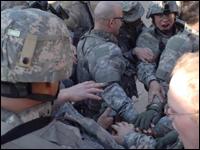Transcript
MIKE PESCA:
From WNYC in New York, this is NPR's On the Media. Brooke Gladstone is away this week. I'm Mike Pesca.
BOB GARFIELD:
And I'm Bob Garfield. Against the backdrop of President Bush's State of the Union Address this week, the Senate Foreign Relations Committee busied itself repudiating the President's chief initiative. The senators voted for a resolution denouncing the so-called surge of 21,000 troops as a last-ditch effort to stem the violent chaos in Iraq. And the press was all over the controversy.
ANNOUNCER #1:
On Iraq, a key Senate committee votes to oppose sending more troops.
ANNOUNCER #2:
- and it was a deeply emotional debate in the Senate Foreign Relations Committee today, echoing the turmoil across this nation.
ANNOUNCER #3:
Today the Senate took the first step in officially rejecting the principle of sending more troops to Iraq.
ANNOUNCER #4:
- saying Bush's plan to increase troops in Iraq is not in the national interest. We'll talk -
BOB GARFIELD:
But while the debate was raging inside the Beltway, according to Washington Post online columnist and military affairs expert William Arkin, the actual surge was underway and virtually ignored by the media.
WILLIAM ARKIN:
Here's the fact. The United States has deployed a brigade of the 82nd Airborne Division forward to Baghdad. That is part of the surge. The United States has extended the tours of a number of Army and Marine Corps units in Baghdad. That's part of the surge. And the United States has deployed the first of two new Marine Corps battalions in western Iraq from Camp Lejeune, North Carolina. That's part of the surge. And hardly any of this has been reported in the mainstream news media.
BOB GARFIELD:
Does secrecy have something to do with it? Media typically refrain from reporting troop movements for fear of giving the enemy too much information.
WILLIAM ARKIN:
Well, in this particular case, I don't think we have this kind of troop movement secrecy problem. It has been the case that the Defense Department and the Army and the Marine Corps have been somewhat modest in announcing these deployments. But I get the impression, Bob, that it's more the case that the news media's mind is elsewhere.
BOB GARFIELD:
However, we've been, you know, in this war for four years now and there has not been a huge amount of coverage to date about troop movements and deployments. Why should NBC News, for instance, want to take pictures of a new battalion hitting the ground in Baghdad?
WILLIAM ARKIN:
The President of the United States has announced a change in strategy. Key to that change is an augmentation, a reinforcement of U.S. forces. And it's part of the story. Period.
BOB GARFIELD:
Obviously, I defer to you because of your extremely broad expertise on these matters - I mean, down to the very smallest units. But is it possible that you are such a military wonk that the story has not caught up to your granular understanding? Because really nothing has happened yet for anybody to report.
WILLIAM ARKIN:
Well, if you're going to give me credit for being such a wonk, then you should also ask me what my intuition is. And my intuition is we are never going to see a significant difference as a result of these 21,500 additional troops being sent to Iraq. Because this surge, this image that we have of the reinforcement of U.S. forces, of Marines storming the beach and paratroopers falling from the skies, is never going to occur.
We are dribbling in our forces, splitting them up amongst many different places, keeping tired troops in Iraq who are ready to come home. In fact, we are hostage to what the Iraqis will do. And that was always the plan, and the surge, to some degree, is merely a political smokescreen for the Bush administration to buy more time.
BOB GARFIELD:
Dude! You buried the lead! The story then, if I'm hearing you correctly, is not that the news media as a group have taken their eye off the ball of the movements on the ground, but they've failed to detect that the vaunted surge is not a surge at all. Is that it?
WILLIAM ARKIN:
Well, look. We have to get through the mountain of valentines which have been written about General Petraeus, the new commander in Iraq. We'd have to get through the mountain of words that have come out of the Senate Foreign Relations Committee and other Congressional committees to be able to determine that they actually care about this question.
So yes, you know, you might be right. I might have buried the lead myself in questioning the surge. But there are so many people out there, Bob, who are writing about this from opinion. And what I'm trying to do is say, hey, let's actually look at what's going on on the ground and ask ourselves the questions, first of all, whether or not these additional troops are there, what they're doing and whether they're going to have a difference.
The military itself wants to dampen expectations about the surge – that they are not putting out the big press releases that say the 82nd Airborne has arrived in Baghdad and a third of the six Marines has arrived in al-Anbar. And why is that the case? Maybe it's the case that the military itself doesn't want to increase those expectations that this change is going to make any difference, because doing so would then make them responsible for the ultimate failure.
BOB GARFIELD:
All right, Bill. As always, a great pleasure to talk to you.
WILLIAM ARKIN:
Thanks for having me on, Bob.
BOB GARFIELD:
Bill Arkin is a columnist for Washington Post Online and is a fellow at the Kennedy School of Government at Harvard University.

